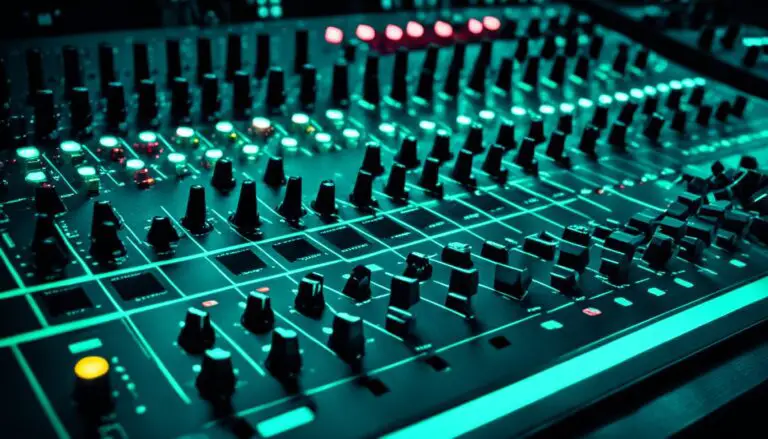Can you spot the difference between an amateur and a professional music producer? The secret often lies in daily habits and methods used. Take inspiration from Ed Sheeran’s ‘dirty water’ concept or Malcolm Gladwell’s ‘10,000-hour rule’. These show mastering music production is simple yet requires hard work.
By making lots of music quickly, your skill with bass lines, drum patterns, and melodies improves. Creating what you love not only makes you feel good but also attracts your audience. Staying consistent means you keep practising, hold onto your fans, and plan your releases well. These tips are key for gaining success in the music world. We’ll explain more about each one and guide you to reach your Music Dreams.
Key Takeaways
- Embrace producing large quantities of music to accelerate proficiency.
- Craft music that you genuinely enjoy to better connect with your audience.
- Consistency in music production is crucial for practice and maintaining audience engagement.
- Both Ed Sheeran’s and Malcolm Gladwell’s theories underscore the importance of dedicated practice.
- Strategic release schedules are essential to keep gaining traction in the music industry.
Start Producing Music the Right Way
Starting right in Music Production is key. It’s not just about the best gear. It’s about using smart strategies for steady growth and quality.

Quantity Over Quality
Ed Sheeran talks about the value of producing lots of work. In the start, making more helps us learn Music Composition and Audio Editing well. This approach helps improve the quality of our work quickly. It fits with Gladwell’s idea that lots of practice leads to mastery.
Make Music You Like
The Creative Process should bring joy. Doing what we love in music, rather than just copying trends, usually brings more real and strong work. This personal touch connects better with listeners, helping us succeed in the long run.
Consistency is Key
Being consistent in what we produce and when we release is vital. A regular schedule means constant practice and keeps fans engaged. It’s building a flow that helps us grow and stay interesting.
Set Goals and Create Effective Systems
Setting realistic Production Goals is key for music production success. Creating good habits with the right systems can make our Music Dreams come true. This leads to growth in Personal Music Production and Professional Music Production Techniques.

Building Good Habits
It’s crucial to build habits like keeping a regular producing schedule. Use systems like alarms and ‘studio hours’ to avoid distractions. This boosts Music Workflow and helps us achieve Production Goals better.
Developing a Production Routine
Creating a structured production routine means planning tasks ahead. This makes our music making more efficient. It involves planning Audio Engineering sessions, scheduling breaks, and setting small goals to keep us motivated. Doing this helps improve Personal Music Production and get professional outcomes.
| Good Habits | Effective Systems |
|---|---|
| Regular producing schedule | Setting alarms, ‘studio hours’ |
| Structured task planning | Mapping out sessions |
| Break scheduling | Small achievable milestones |
Maximise the Use of Your DAW Software
In music production, it’s vital to master your DAW software. This can greatly improve the quality of your sounds and enhance creativity. You should aim to fully understand the tools available, from basic to advanced features.
Mastering Stock Plugins
Stock plugins are often overlooked. However, they can help you achieve professional-grade sound.
- EQ and Filters: They are necessary for processing your audio and controlling your sound’s shape.
- Compression: Knowing how to use compression can make your music mixes better.
- Reverb and Delay: These effects can add space and depth, which are key in recording.
Learning to use these plugins well means you may not need expensive third-party options. This underlines how important it is to make the most of what your DAW software offers.
Exploring Advanced Features
Discovering your DAW’s advanced features can make your music stand out. Features like sequential programming can automate tasks and skyrocket your creativity.
- Automation: It allows you to adjust things dynamically, like volume, during playback.
- Macros and Custom Scripts: These can make your work more efficient by automating common tasks.
- Advanced MIDI Programming: It’s great for live shows, creative sequencing, and detailed sound design.
Using these advanced features can expand your music production horizons. By experimenting with them, you can greatly improve your recording and produce more professional sound.
Important Recording Techniques
Learning advanced recording techniques is key for music producers. It helps them create tracks that sound professional. They need to know about compression and EQ to start.
Fundamentals of Compression
Compression helps manage your audio’s dynamic range. It smooths out differences between loud and quiet parts. This stops audio from clipping and sounds consistent. Tinkering with settings on your devices makes your sound polished.
Knowing about compression is crucial for skilled recording. It’s one of the first steps to make your tracks sound pro.
Balancing EQ to Reduce Muddy Sounds
For a clean sound, you must balance frequencies to remove muddiness. EQ is the tool for this job. It gets rid of low-end muffle. Each sound then has its own clear spot. This skill is key for making your mixing pro-sounding.
“Effective utilisation of EQ and compression techniques ensures that we address the critical aspects of frequency balancing and dynamic range, leading to cleaner, more refined audio tracks.”
| Technique | Purpose | Outcome |
|---|---|---|
| Compression Techniques | Manage dynamic range and prevent clipping | Consistent audio levels and polished sound |
| Frequency Balancing | Eliminate muddy sound | Clearer mixes with defined frequency ranges |
| Home Mastering Basics | Apply basic mastering techniques | Professional-sounding final mix |
Enhance Audio Mixing and Sound Engineering
In the music world, audio mixing and sound engineering are key to making tracks stand out. It’s all about paying close attention to details. We focus on dynamics, reverb, and effects to create a top-notch final track. This part of making music involves solving tech problems and making sure the sound spreads well in stereo.
To get these elements right, we always work on our mixing skills. Sound engineering goes beyond just adjusting sound levels. It’s about making sure every sound shines in the track. Doing this, we make the music feel deep and alive. It’s crucial to blend beats and sequences well to keep everything in harmony.
Becoming a sound pro is a journey of continuous learning and improvement. We try different methods to make our audio sound better. This way, the music really touches people. Getting good at these complex methods turns simple tracks into amazing sounds. It shows our strong dedication to making music that stands out in the crowd.



